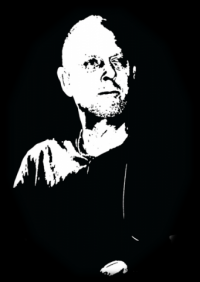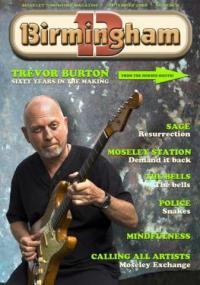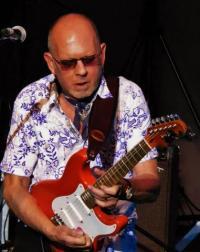Trevor Burton was born in Aston, Birmingham. He started playing guitar at a young age and by 1963 was leading his own group called The Everglades. In 1964 he joined Danny King & The Mayfair Set, along with Keith Smart formerly of The Everglades (drums), Roger Harris (keyboards), Denis Ball (Bass) and vocalist King.
Trevor Burton was a founding member of the sixties chart topping band The Move and was initially with them from 1966-1969 and is touring again in 2010 as ‘The Move featuring Trevor Burton & Bev Bevan’ with ‘The Animals and Friends’.
When he left in 1969 he stayed down south with his close friend Steve Winwood; Steve had just formed the band Traffic. Trevor Trevor decided to chill for a while, but soon got the urge to play live again, this has always been his first love. He got in touch with Steve Gibbons with the view to forming a new band, together with Denny Laine formerly with the Moody Blues, and Allen White from The Plastic Ono Band.they formed the band called Balls. After the split with Balls in 1971, Trevor spent the next few years as one of the top session musicians with Island Records. At the request of Raymond Froggatt, Trevor returned to his hometown of Birmingham where he worked with Ray until 1976.
Trevor teamed up once again with his close friend Steve Gibbons to enjoy chart success and top 10 hits with the Steve Gibbons Band. For the next 7 years he toured the world with Steve. He left in 1983 to form his own band playing his unique style of blues. They started performing twice weekly at the Red Lion, Sparkbrook, Birmingham with a line up including sax player Steve Ajao. In 1985 the band recorded an album entitled 'Double Zero'.
He teamed up with Robert Plant of Led Zeppelin as one of the Journeymen Musicians. Then he joined The Big Town Playboys touring the UK and Europe, he performed shows with Noel Reading a friend from the 60s and spent 9 months on the road with Dexies Midnight Runners.
>
READ ALL ABOUT IT!
60’s wild child turns 60
…And looking good on it when you consider what he put himself through at the heart of the sixties music scene!
Trevor was born and grew up in Aston and says that he got into music as soon as he could think!. His first guitar was bought for him when he was 7 by his aunt and uncle whilst on holiday in Great Yarmouth. It wasn’t that they wanted to encourage him, just that he begged and pestered everyone until he got one. He describes it as an acoustic ‘thing’. It soon ended up with 4 strings, the tuning was improvised and he played for hours and hours, his own take on Buddy Holly, Little Richard, Chuck Berry, Cliff and the Shadows, all the rockers of the day. He formed his first band at 13, The Everglades, with friends he met at Dudley Road ice rink. Trevor was the front man, and the bass player couldn’t play, he just stood there un-amplified but no one knew the difference in those days. He has a picture of The Everglades performing at the sea scouts hut at Edgbaston Reservoir using just two guitar amps hooked up to the ceiling light fitting. "When we came on stage, everyone was stunned, they thought it was so loud, they hadn’t heard electric guitars before and complained immediately", a ‘stop that infernal jamboree’ moment if ever there was one. It might all sound very amateurish but at 13 he was playing six times a week and earning twice as much as his dad who had a gruelling foundry job.
When he left school he already had two years gigging experience and after trying a job as a motor mechanic apprentice for just one week he knew he had to follow music as a career, so with the backing if not total approval of his parents, at just 15 he turned pro and joined Danny King and the Mayfair Set as the guitarist. This lasted about 18 months. "Danny King was well respected around the Midlands and could have been a huge star but had no interest in becoming one and hated the idea. A&R men would always be coming up from London trying to sign him but he wouldn’t have it".
The nerve centre of the music scene back then was The Cedar Club on Constitution Hill. It was open until 3a.m. and everyone would meet there after gigs and there would always be a band on there too. This is where he got to know Roy Wood from Mike Sheriden and the Nightriders and Ace Kefford and Bev Bevan from Carl Wayne and the Vikings. One night, he and Ace Kefford had the bright idea of plundering the youngest member from several bands, he approached Roy Wood who was up for it, next was drummer Bev Bevan, also up for it and eventually Carl Wayne followed his own band members, the decision being swayed by his van, P.A. and business skills. It didn’t go totally to plan but they destroyed The Vikings and The Move was born. In 1966 they played their first gig at The Belfry performing mainly Mowtown covers.
They soon signed to Moody Blues and T. Rex manager Tony Secunda of Marquee Artists and began playing at the infamous Marquee Club in London every Wednesday for 9 months. They soon had a massive following and queues would form around the block. Two live recordings from The Marquee have surfaced recently and will be available as part of a new box set being released imminently.
With their original sound and big harmonies they needed original material to interest record companies
And fortunately, Roy Wood was in the band. Their first original song written by Roy was ‘Night of Fear’ which got them signed to Decca and when the publicity machine of Tony Secunda sprang into action, there was no stopping it.
Trevor was still living with his parents in Aston at the time and had a 3.4 litre Jaguar parked on Wainwright Street outside their back-to-back with no bathroom. He was regularly performing on Juke Box Jury and Ready Steady Go and gangs of girls would come and sit on the wall outside hoping for a swoon inducing glimpse of their new local heart-throb.
In 1967, the ‘summer of love’, libel action was taken against the band along with artist Gerald Scarfe, the advertising agency and the printers of a postcard promoting the single Flowers in the Rain. It had a caricature by Scarfe of Harold Wilson in the nip with his political secretary Marcia Williams on the floor with her typewriter, and his wife Mary peering through the curtains, the typed page reading ‘Disgusting, depraved and despicable though Harold may be, flowers in the rain is still a beautiful record’. The first thing the band knew about it was when they emerged from a gig to face the over excited world's press thrusting microphones and cameras into their faces. It had all been masterminded by manager Tony Secunda who claimed that it was never a publicity stunt and it was only the resulting libel action that made it appear that way. In all fairness it did get them on the front page of every newspaper in the country but at a high price.
After arriving late at the High Court in a red Rolls Royce, they faced Quentin Hogg Q.C. He hated anything anti-establishment and said that they had "made use of malicious rumours concerning Mr. Wilson’s character and integrity" and went on to condemn the artwork as "Scurrilous". He decided to make an example of them by ordering that all royalties from the single were to go to a charity of Mr Wilson’s choice, which initially was The Spastics Society and The Amenity Fund for Stoke Mandeville Hospital. In the 1990s, the Observer newspaper reported the royalties so far as exceeding £200,000 and found that The Harold Wilson Charitable Trust had extended the range of beneficiaries to reflect the ex-PM's wide-ranging interests, including among others, the Oxford Operatic Society, Bolton Lads Club and the Jewish National Fund for Israel. In 1995 Roy Wood suggested that royalties in future go to the Birmingham Children's Hospital but Lord Wilson's solicitors replied that they could not change the terms.
In a book by Mr Wilson's press secretary Joe Haines, he alleges that Mr. Wilson’s doctor offered to ‘dispose’ of Marcia Williams when she threatened to reveal the alleged affair, but everyone denies it nowadays. The story of Harold Wilson and Marcia Williams was retold in a 2006 BBC Four drama, The Lavender List, written by Private Eye's deputy editor Francis Wheen. It proved equally provocative. Williams, now known as Lady Falkender, successfully sued the BBC for £75,000 plus costs.
Flowers in the rain is renowned to be the first record ever played on Radio One (if you don't count the jingles) and it is rumoured that the Kaiser Chiefs are to do their own version of it. Trevor only made £1000 out of The Move, "Roy wrote all the songs so he got all the royalties" ...and had them taken from him as well!
As teenagers the band revelled in their new found national fame but for Trevor, his part was to last for only two and a half years, notching up five top 5 singles culminating with their only No1, Blackberry Way. Towards the end of his time with The Move he was Jamming a lot with Jimi Hendrix and spending a lot of time down at Steve Winwood’s country house with Traffic learning to play what they called ‘proper music’. Not surprisingly he says, "After spending time with these people I just couldn’t go back and do Flowers In The Rain and Blackberry Way, I aspired to something more and didn’t want to be a pop star any more, and haven’t been one since!"
Trevor’s next project was a band called Balls with Steve Gibbons of The Ugly’s and Denny Laine of The Moody Blues. Later after Steve drifted off to do his classic album Short Stories they were joined by John Lennon’s drummer Alan White who went on to spend the rest of his career with prog rock giants Yes
He says "We never really did anything, we just got an advance and spent it partying for a year!"
Inevitably in 1971, after producing just one single, the band split and he got a flat with Jimi Hendrix’s bass player Noel Redding in Notting Hill Gate where he spent his days as a session player at Island studios across the road. He and Roy Wood both sang on Jimi Hendrix’s You Got Me Floating. He also loved jamming with the local luminaries such as his new pal Paul Kossoff who lived nearby and occasionally performing as an honorary member of underground band The Pink Fairies, a psychedelic jam based ensemble who shared similar tastes in music and recreational activities as Hawkwind with whom they gigged regularly, not always with any coherence it must be said! He contributed several tracks to their 1972 album What a bunch of Sweeties, but the drug fuelled lifestyle soon caught up with him and when Tony Secunda turned up at his flat one night with a bag of money and said "Get yourself back to Birmingham or you’re going to die, you‘re killing yourself", he knew it was true and did the wise thing.
On his return he teamed up with Raymond Froggatt for about a year until one day without warning the whole band was sacked. The respite period that followed paved the way for hundreds of bands since to tread the boards at the infamous Old Railway on Curzon Street, after he, Roger Hill and Tom Farnell started playing there twice a week and it became a regular gig. He eventually found a more permanent home when he reunited with Steve Gibbons, a move that would see them constantly touring Europe and appearing on TV shows around the world as The Steve Gibbons Band. The highlight of this period has to be the European Tour followed by a coast to coast American Tour they did in 1976 as support to The Who, playing several shows in stadiums to 80.000 people a night, never less than 12.000. He says "It was very scary, especially when they don’t know who you are, but we did alright and it was great fun touring with Roger Daltrey and Keith Moon who I’d known since The Move days, Pete Townsend was a bit stand offish though". It turned out to be the last tour Keith Moon did before he died. In the 8 years Trevor spent with The Steve Gibbons Band they recorded 5 albums and one hit single, a cover of Chuck Berry‘s Tulane.
He left the band in 1983, turning his back on the music business and all the trappings of celebrity and began the final chapter of his career at The Red Lion on Ladypool Road with the first and arguably the best incarnation of The Trevor Burton Band, featuring Tony Bayliss, Trevor Crump, Stuart Ford and Ben Anon, a heady mix of funky reggae blues that had audiences intoxicated, pub rock at its best. Some incredible players have come and gone over the years, Micky Barker (Magnum), Roger Hill, Mr C, Richard Tandy (E.L.O.) Jimmy Simpson (UFO), Martin Curley, Mark Whitehouse, Eddie Moohan, Maz Mitrenko and sadly no longer with us, Steve Dolan and sax legend Billy Paul.
A few years ago Trevor suffered a major setback when he contracted Legionnaires’ disease whilst playing in Sardinia. He was diagnosed just in time to save his life and after being set about by syringes the size of bicycle pumps he spent nearly a year recovering, mainly from lung damage, before he was able to sing comfortably again.
Nowadays he enjoys the freedom of a modest three piece with Bill Jefferson on drums and Perry Connor on bass, and still fits in gigs around his busy schedule of performing with Bev Bevan promoting The Move back catalogue and back where he started with Danny King as part of an all star line up promoting Laurie Hornsby’s definitive book Brum Beat which chronicles the Birmingham music scene of the 1960’s and 70’s. There are currently five theatre dates booked for October but it will be a different show this time as Steve Gibbons and Laurie Hornsby have dropped out and Raymond Froggatt has joined Trevor, Danny King and Bev Bevan.
Personally I’m very happy to have had the opportunity over the last 20 years to witness Trevor at his best, slogging away in the pubs and clubs of Birmingham (with occasional sorties into Germany), and I have been inspired and humbled by some of best musicians of this genre that Birmingham has to offer.
It is some testimony to his raw energy and musical prowess that at many of his gigs, there is a new generation of pilgrims sitting in reverence at the front, watched over by his ‘family’ of loyal followers. Not bad for a Granddad! Long may it continue.
It’s also worth taking a moment here to lament the systematic closure of nearly all of Birmingham’s live music venues without which it is impossible for aspiring and established musicians to make any kind of subsistence level earnings. If they can close down a well established venue close to Broad Street because of ‘noise’, then there has to be an ulterior motive however sinister it might sound. Always look for the vested interest. Music has been taken out of the hands of the innovators and handed on a plate to the production teams of mediocrity and the banality. For decades, live music has been a major part of Birmingham’s identity, but those days are over. New licensing laws have seen to that. Let’s face it, it’s also pub culture they’re trying to abolish, but we’re not all out there binge drinking, some of us just prefer live music to the rubbish on tele! Every classic British band there is owes it’s success to the apprenticeship it served in the pubs and clubs. Without this there would be no U2, no Oasis, Muse, Elbow or newcomers like Scott Matthews. A few months after Scott played at the Bull’s Head he was picking up an Ivor Novello award for a song recorded on Woodbridge Road! Sadly, in this instance, it appears we’re fighting a losing battle and it seems ever more likely that gangs in suits will prevail when it comes to live music. Anyway, lament aside, cheers Trev and thanks for assailing my wax flappers with your Strat wrangling. As the musicians union says, keep music live.
Brett Wilde.
Latest News:
During 2018 Trevor released his first solo recording 'Long Play'. Trevor plays some of his self penned material as well as raw acoustic versions of 9 other songs.
Due to a number of complex and ongoing health issues Trevor made the difficult decision to retire during the summer of 2018 and is now enjoying a quieter life with his wife and family.




